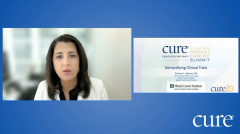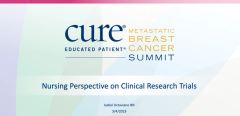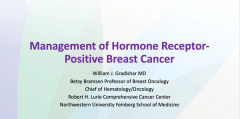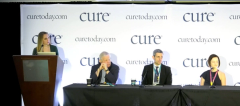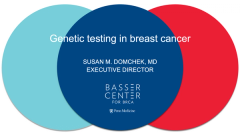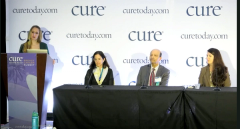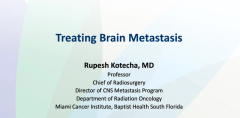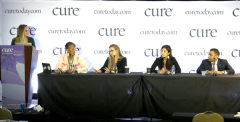
Educated Patient® Breast Cancer Summit at MBCC Demystifying Clinical Trials Presentation: March 4, 2023
Watch Dr. Reshma Mahtani, from Miami Cancer Institute, Baptist Health South Florida, discuss clinical trial myths during the CURE Educated Patient® Breast Cancer Summit at MBCC.
Episodes in this series

While clinical trials help to advance the treatment landscape in breast cancer care, many myths remain; however, Dr. Reshma Mahtani aims to demystify these moving forward.
At the CURE® Educated Patient® Breast Cancer Summit, held live and virtual at the Miami Breast Cancer Conference, Mahtani, chief of breast medical oncology at the Miami Cancer Institute, Baptist Health South Florida, presented an overview of the drug development process and addressed common questions patients have when considering clinical trial participation.
“Clinical trials are the way we have validated all of our treatments that we offer patients,” Mahtani said in an interview with CURE®. “Including many of the new exciting therapies that we have. We are always very appreciative of not only the patients, but also their families and caregivers for participating in trials. For patients, trials represent a great opportunity to gain access to therapies they wouldn't be able to access outside of the clinical trial setting. That being said, a clinical trial is not for everyone. So, the advice that I give to patients is to consult with their health care team, most importantly, their physician, to understand where they are in their treatment journey and whether it is reasonable to consider participation in a trial.”
Clinical Trial Phases
Clinical trials follow a standardized development pipeline to ensure their safety and efficacy before being approved. Before any patients receive a dose of an experimental therapy, the drug goes through laboratory testing, establishing that the mechanism of the drug is likely to positively and safely impact the drug’s target, while also gathering data to figure out the correct starting dose.
In a phase 1 trial, or dose-finding study, researchers establish the safe and effective amount of treatment to give to patients. They begin with a very low dose, then continuously increase the amount until they see their desired result or side effects emerge, also called toxicity. If there is no toxicity doses will escalate quickly, but when side effects are observed doses are escalated slowly and cautiously to protect participants.
“The general principles of a phase 1 trial are to maintain rapid escalation in order to avoid exposing too many patients to sub-therapeutic doses, while preserving safety by limiting the frequency of toxic events,” Mahtani said. “So more than one patient is treated at each dose level, and we are quickly but safely trying to arrive at the correct dose to move forward with in larger trials.”
A phase 2 trial continues the work of the phase 1 trial on a larger scale. There are more patients involved, and while a phase 1 trial is more concerned with establishing the safety of a treatment a phase 2 trial focuses on the efficacy of a treatment.
The phase 3 trial is the largest study before Food and Drug Administration (FDA) approval, and is intended to demonstrate the new treatment is an improvement over the current standard treatment option. This trial will directly compare the new experimental drug to what doctors would usually do, and the experimental drug must outperform the standard treatment or offer a new option for patients who do not see results on other standard treatments.
Participating in a Clinical Trial
Mahtani explained that there are two ways to get involved in a clinical trial if a patient is interested. The first is the most common and likely the easiest: ask the doctor.
“Make sure that your interest in a trial is conveyed to your physician, your treating oncologist. Usually that physician obviously has your best interest at heart. If there is a clinical trial that's available at that institution, they would offer it, or they may even help you find out what studies are available at neighboring institutions.In most cases the physician is raising the option of a trial.”
Another path to a clinical trial is to do one’s own research. Information on recently concluded or currently recruiting clinical trials is publicly available.
“Sometimes patients seek these trials out on their own, which is certainly reasonable. There are ways to do that through clinicaltrials.gov, or to go on different institutions’ websites where available trials may be detailed. Whether or not the patient is actually eligible would involve a review of all of their treatments to date and may even involve some consultation with their treating physician who knows them best.”
Mahtani encouraged all patients to discuss clinical trials with their doctors, even if they find a study they’re interested in themselves.
“There are many questions I would encourage patients to ask about trial participation in order to have a clear understanding of the study. Some of these include: Why you are being offered the trial? What are the options outside of a trial? What is the study aiming to answer?What phase is the study? Is there any information on effectiveness and safety that can be shared? What are the risks associated with participation?,” she concluded. “It’s important to make that joint decision in conjunction with your health care team. Just trusting your gut instinct about what may or may not ultimately be right for you is important advice.”
For more news on cancer updates, research and education, don’t forget to


